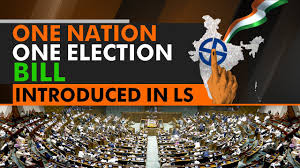NEW DELHI: Two Bills to amend the Constitution to facilitate holding of the Lok Sabha and the Assembly elections simultaneously were tabled in the Lok Sabha today, triggering protests by the Opposition.
The Constitution (129th Amendment) Bill, 2024, was introduced in the Lok Sabha by Law Minister Arjun Ram Meghwal after a nearly 90-minute debate. Meghwal also introduced The Union Territories Laws (Amendment) Bill, 2024, which seeks to align elections in the union territories of Puducherry, Delhi and Jammu and Kashmir with the Lok Sabha polls.
Sources said the Bills might be sent for further scrutiny to a joint parliamentary panel. The terms of the panel were likely to be announced tomorrow.
The moment Meghwal rose to table the Bills, opposition members led by the Congress stood up to oppose the move. Among the prominent MPs who led the charge against the proposed legislation were Congress lawmaker Manish Tewari, Samajwadi Party’s Dharmendra Yadav, Trinamool Congress’ Kalyan Banerjee, DMK’s TR Baalu and Supriya Sule of the NCP (Sharad Pawar).
Tewari slammed the proposal as “beyond this House’s legislative competence” and said it must be “withdrawn immediately”. Yadav warned that “this is the path to dictatorship” while Banerjee said it “hits the basic structure of the Constitution”.
Allies of the BJP the TDP and the Shiv Sena faction led by Maharashtra Deputy Chief Minister Eknath Shinde backed the Bills. Incidentally, the Bills also received support from the YSR Congress, the TDP’s rival in Andhra Pradesh. The Bills were formally introduced in Parliament by a simple majority, as required under the rules. While 263 MPs voted in favour of the Bills, 198 opposed these.
The margin was flagged by the Congress, which claimed it showed the government lacked support, even at this stage, to pass the Bills.
“A two-thirds majority (307) was needed of the total 461 votes… but the government secured only (263), while the Opposition got 198. The ‘one nation, one election’ proposal failed to gain a two-thirds support,” Congress MP Manickam Tagore said on X, with a screenshot of the e-voting system.
Ahead of the Bills being tabled, the government and the Opposition faced off with Parliamentary Affairs Minister Kiren Rijiju saying that the Congress lacked a “reasonable argument”, while the Opposition said the proposal “is meant to throttle democracy”.
Last week, the Union Cabinet had cleared the two Bills to amend the Constitution and allow the ruling BJP to implement its one nation, one election proposal. The Bills and the amendments were recommended by a panel led by former President Ram Nath Kovind, with Home Minister Amit Shah as a member, in its report in September.
The first Bill contains amendments linking the term of state Assemblies to that of the Lok Sabha — this means the term of state governments elected after 2029 will end with the tenure of that Lok Sabha. An Assembly elected in 2031 will dissolve in 2034 and not complete its five-year term so that its next poll cycle can be synced with the 20th Lok Sabha elections. The second Bill seeks to align elections in the union territories of Puducherry, Delhi and Jammu and Kashmir with those in others states and the Lok Sabha.
These provisions are not expected to come into effect before the 2034 elections as according to the Bills, these will be enforced after an “appointed” date, to be notified after the first sitting of a newly elected Lok Sabha. If a Legislative Assembly is dissolved ahead of the schedule, a mid-term poll will be held for a legislature to complete its term.


